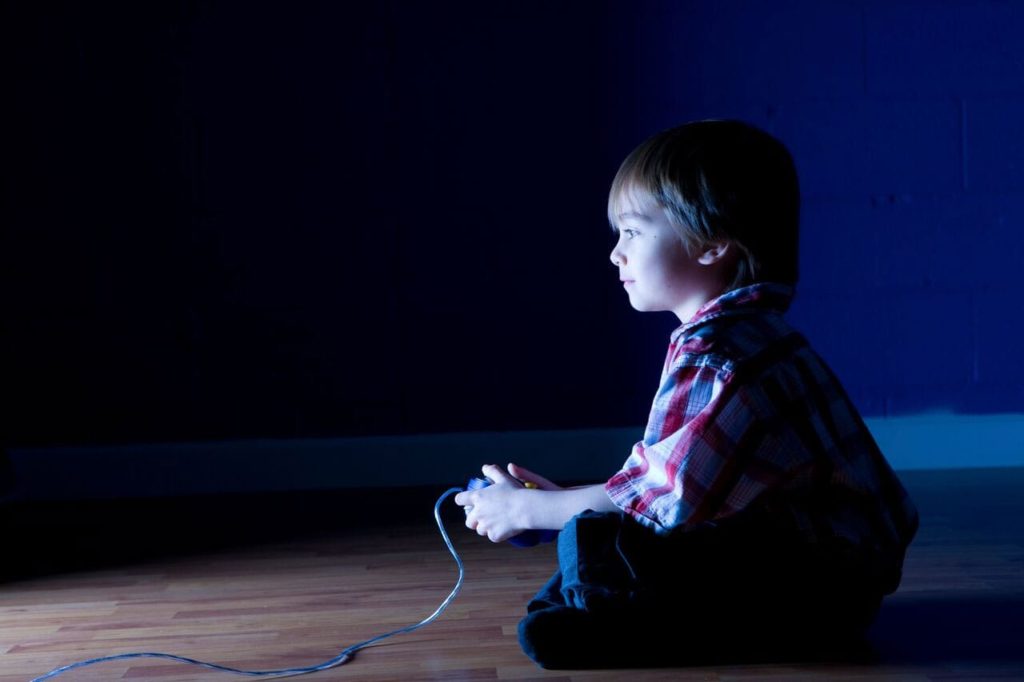More than 200 million Americans play video games, accounting for over two-thirds of the population, with around 3 percent of these playing at a “pathological” level. Leftover stereotypes would have you believe that these are largely “geeky,” socially-inept teenage boys, but in fact, 47 percent of gamers are women and the most frequent game purchasers are around 35. Video games pervade modern culture, but experts from Australia are warning about the risk of video game addiction, pointing out that kids addicted to gaming are more likely to develop mental illnesses. Video game addiction is a relatively new phenomenon, but learning more about it and the associated health risks helps to understand the level of risk from epidemic-level gaming.
Video Game Addiction
Video game addiction—although not officially recognized by the latest Diagnostic and Statistical Manual of Mental Disorders (the DSM-5)—is known to share many traits with drug and alcohol addiction. Gaming increases the size of the reward center in the brain, meaning that gamers get a huge dopamine boost when playing. Dopamine is central to many addictions, including cocaine dependence and compulsive gambling, so the fact that it’s implicated in gaming adds a great deal of weight to the idea of video game addiction. Like drug addicts, video game addicts continue to play despite abundant negative consequences and often destroy their careers and relationships because of the time they dedicate to the habit.
The Experts’ Warning
According to the Australian experts, many children and adults suffering from video game addiction are laughed out of doctors’ offices when they seek help for the problem. This has led the addiction experts to speak out about the risk of video game addiction at a conference held earlier this month, with Dr. Philip Tam of Sydney University claiming that there were probably hundreds of thousands of children aged 8 to 14 with “significant problems” related to excessive gaming. He claims cases are coming to him from all over Australia (with parents willing to travel across the country to find treatment) and in one instance involved a child who’d played games for 60 hours without sleep or so much as a break. According to Dr. Tam, the proportion of gamers who become addicted is around 10 percent, much like drug and alcohol addictions. In the most severe cases, kids drop out of school, become violent toward their parents and possibly develop mental health problems.
The Evidence
It’s important to note that this story merely comes from the opinion of individual physicians, as opposed to an objective piece of research. However, a study from Singapore that looked at 3,000 school children found that around one in 10 was addicted. There is therefore a chance that the statistics for the U.S. are actually underestimating the prevalence of the issue, and that the real figure is more in line with the rate of addiction to other substances. The same piece of research also found links between gaming and mental health problems. An important note is that the addicted gamers were more likely to have had behavioral or mental health issues before they started playing games, but the conditions worsened when they started playing. In addition, if the children stopped playing games, depression and anxiety were shown to improve. The evidence that there is some negative impact from gaming is growing.
Is the Explanation in the Design?
There are many possible explanations that could make one game more addictive than another. There is a theory that massively multiplayer online role playing games (MMORPGs like World of Warcraft or RuneScape) are more addictive because they combine the ordinary lure of games with a vibrant social community. One ex-World of Warcraft player was on the game for 10 hours a day when he was 15 years old before eventually realizing it was taking over his life and stopping at age 20. There is another argument that incorporating elements of behavioral psychology into the gameplay mechanics makes the experience more addictive. This is analogous to a famous experiment by B. F. Skinner, in which rats were made to press a lever for food. If the food is given every time the lever is pressed, the rats only eat when they’re hungry. However, if the food comes more sporadically and unpredictably, the rats continue to press the lever over and over until they die from exhaustion. Similarly, games that sporadically reward success (through mechanisms such as “leveling up” a character) are thought to suck players into gaming addiction more readily for this reason. This theory appears to fit with the experience of Hilarie Cash—co-CEO of reSTART, a video game rehab center—who says that almost all of her clients are male. She says females are more likely to play social or puzzle games and stay in control of their habit. This seems to fit because these games are less likely to incorporate those irregular rewards, which behavioral psychology tells us are a strong motivator in continuing an action beyond ordinary levels.
Conclusion
Demonizing games is a popular pastime for the media (especially in cases of mass shootings), but the reality of the situation is much more complex. Current thinking suggests that anything from underlying mental illness to the specific design of the game could have an impact on the likelihood of gamers becoming addicted. It seems likely that, as with drug and alcohol addiction, some people are more susceptible to video game addiction through genetic or psychological mechanisms, and as such it isn’t accurate to place the blame on games. In fact, this merely appears to be another avenue through which the human pre-disposition to addiction can manifest itself.


